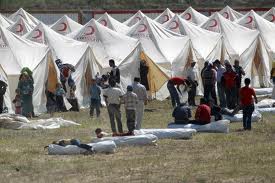 Refugees who have crossed the Turkish border say the shaky ceasefire in Syria has done nothing to convince them that the year-long revolt against President Bashar al-Assad is over.
Refugees who have crossed the Turkish border say the shaky ceasefire in Syria has done nothing to convince them that the year-long revolt against President Bashar al-Assad is over.
“The killing in Syria hasn’t even started yet,” says Abdullah Kartan, a teacher who fled to the Reyhanli refugee camp in Turkey.
“Syrians have made a decision and if three-quarters of them have to die, if their houses have to burn, they will do it to get Assad out. There is no going home until the regime falls.”
Syria’s Interior Ministry urged Syrians who have escaped violence to return to their homes, but Kartan – staring beyond the rows of white tents towards the green, mountainous border – said no one was thinking about heading back.
“There is not enough trust left in our country for any kind of truce. Assad was supposed to move his tanks before stopping the shooting, but he didn’t because he knows he really will lose control if he does,” says Kartan, who is from the countryside of Hama, one of the centers of rebellion against four decades of Assad family rule.
Also lingering outside the Reyhanli camp was a cluster of young men, smoking cigarettes and eyeing the empty highway leading to the metal gates of the Turkish-Syrian border crossing. Only a few cars passed.
“The rebels are waiting, preparing right now because they have the right to respond,” whispers one man, who calls himself Abdulrahman. He and the men around him said they worked with the rebel Free Syrian Army (FSA), slipping in and out of Syria.
No-one at Reyhanli was explicit about the extent of their involvement with the FSA. Comments from refugees interviewed suggested it ranges from moral support to aiding combat.
“Of course if we had the power we would resist the regime,” Abdulrahman said. “We’re committing to the truce by default because we have no choice. We don’t have enough weapons.”
“No, we are following the orders of our commanders,” snaps another man wearing green army fatigues who calls himself Maher. He paces with a slight limp around the wire fences surrounding the camp’s entrance.
NO RETURN
Activists said Syrian troops held their fire on Thursday after the ceasefire brokered by international peace envoy Kofi Annan came into force. But soldiers and tanks were still in position in many towns, they said, in defiance of the deal [nL6E8FC02J].
“This is the problem: if the FSA turns in its weapons as the regime will ask us to do, we will either be thrown in prison or our bodies will be dumped on the street,” Maher, 26, said.
“The army has not committed to the most important part, withdrawing their forces and their tanks. They can’t make the rebels give up their guns.”
For other refugees, returning to their everyday life is not even an option.
“The soldiers burned down around 100 homes in the village of Kileh when it rebelled, and mine was one of them. It was burned to the ground, even the chickens were lying dead on the floor. Why would I leave here? We have no work, we don’t even have a house,” said Abdelatif Muadil, wearing a tattered sweatshirt over a faded traditional Arab robe.
The farmer, 65, from the Idlib countryside close to Turkey, said his sons remained in his village “because they still have work to do” – a vague reference to the rebels.
Nearby, the young Abdelrahman gives a nod of approval: “Everyone knows this truce is temporary.”
Reuters

Leave a Reply
You must be logged in to post a comment.